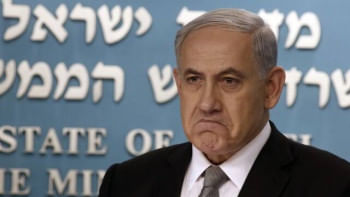Biden-Netanyahu standoff complicates the Gaza conflict

Amid the extraordinary carnage in Gaza, the international community is witnessing with surprise and bemusement the spectacle of the US president standing eyeball to eyeball with the Israeli prime minister, with neither of them signalling any desire to give way. This spectacle is particularly astonishing since Joe Biden has consistently prided himself on being Israel's best friend and, during the Gaza war, has proffered almost unstinting support to Israel's war efforts.
Ties between the US and Israel, two of the world's closest allies, have generally been described with words such as "tightly knit," "unwavering support," and "ironclad." What, then, has gone wrong? It now appears that the large-scale killing of Palestinians in Gaza and the widespread pro-Palestine agitations in the US and several European cities have finally awakened the US president's conscience, or just rudely reminded him that he is losing support in the presidential race.
After seven months of wanton death and destruction, Biden started counselling restraint just as Benjamin Netanyahu was preparing to order a fresh assault on Rafah, in southern Gaza, where nearly two million displaced Gaza residents have found temporary, albeit squalid, refuge.
All through March, the US president repeatedly conveyed to Netanyahu the need for a ceasefire and increased humanitarian supplies to the beleaguered enclave. Senate Majority Leader Chuck Schumer described Netanyahu personally as a liability for Israel. Finally, in an unprecedented move, the US declined to veto a UN Security Council resolution that called for a cessation of hostilities and increased flow of humanitarian aid in Gaza.
Living up to his reputation as a master political manipulator, Netanyahu then adroitly shifted attention from Gaza to Iran by attacking the Iranian consulate in Damascus, Syria, killing seven senior Islamic Revolutionary Guard Corps (IRGC) officers, including two generals. The prospect of an Iranian retaliation pushed the US immediately back to the Israeli side. After the October 7 attack, Biden said, "We will make sure Israel has what it needs to take care of its citizens (and) defend itself." Secretary of State Antony Blinken, meanwhile, gushed, "… as long as America exists, you will never ever have to (defend yourself). We will always be there by your side." Fortunately for regional security, April's tit-for-tat exchanges between Iran and Israel were largely mere demonstrations of technology and capacity, with both sides deciding not to escalate matters further.
This brought Gaza back to the US's attention, amid widespread demonstrations on numerous university campuses expressing support for Palestinian aspirations, referring to Biden as "Genocide Joe" and calling for an immediate end to the conflict. On May 6, Biden advised Netanyahu not to invade Rafah. The Israeli prime minister immediately ordered aircraft to hit targets in southern Gaza, while a brigade seized the Rafah border crossing with Egypt. Another brigade moved to the border with eastern Rafah.
Two days later, in an interview on CNN, Biden publicly set out his red line, saying, "If they (Israelis) go into Rafah, I'm not supplying the weapons that have been used to deal with the cities." He also ordered a pause in the delivery of 3,500 bombs to Israel. Netanyahu remained unfazed. He categorically stated, "If we must, we shall fight with our fingernails."
Israel has not yet conducted a full-scale assault on Rafah, but it continues to launch regular attacks on targets there and intense bombing at the Rafah-Egypt border. Several dozen Palestinians have been killed. Israel has also dropped leaflets warning civilians that they will face "extreme force" if they remain in the area. Last week, Israel hit a UN vehicle carrying emergency medical supplies to Rafah, while intensifying attacks in northern Gaza. Blinken has warned helplessly that the Rafah attack will inflict "terrible harm" on the population.

The stakes for Netanyahu are very high. A ceasefire, without Hamas having been "annihilated," would diminish the prime minister's standing among his right-wing support base and could even lead the extreme right to topple his government. As soon as he ceases to be prime minister, Netanyahu will face the revival of criminal cases against him and possible imprisonment. Hence, he has every reason to continue the conflict in Gaza, at least until Hamas' military commander, Yahya Sinwar, has been apprehended or killed and he can proclaim victory.
Netanyahu is on solid ground at home. He faces little domestic opposition to the conduct of the war, except from the families of the hostages. No influential group is calling for halting the Rafah attack or for an increase in humanitarian assistance.
The Israeli prime minister believes he can face off with Biden. He has already taken on a Democratic president, Barack Obama, on his home turf, when in March 2015 he attacked the nuclear agreement with Iran at a joint session of Congress. Now, he again enjoys the full backing of the Republicans who are criticising Biden for betraying Israel's interests by halting military supplies.
In this standoff, it is Biden who seems to have the weaker hand. In the presidential campaign, polls are still placing him neck and neck with Donald Trump, with the latter even marginally ahead in the swing states. The pause in supply of munitions is hardly likely to make much difference, given that Israel already has enough weaponry for the Rafah assault and billions of dollars of US supplies are ready for delivery.
A Biden climbdown is very likely. As an observer has noted cynically, "US red lines with Israel have been known to turn pink."
Talmiz Ahmad is a former Indian ambassador to Saudi Arabia.
This article was first published by Arab News on May 17, 2024, and is being republished with the author's permission.
We welcome your contributions and analysis of global events, and responses to our articles. To submit articles to Geopolitical Insights, please send an email to [email protected].
Follow The Daily Star Opinion on Facebook for the latest opinions, commentaries and analyses by experts and professionals. To contribute your article or letter to The Daily Star Opinion, see our guidelines for submission.

 For all latest news, follow The Daily Star's Google News channel.
For all latest news, follow The Daily Star's Google News channel. 












Comments